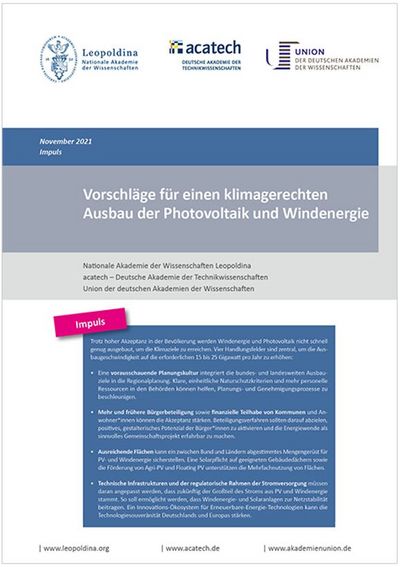Proposals for a climate-friendly expansion of photovoltaics and wind energy
Photovoltaic and wind power plants play a key role for a climate-friendly energy supply. In the future, they will cover a large part of the energy demand – also in the heating and transport sectors. Studies show: For climate neutrality in 2045, the rate of expansion needs to increase by three to four times that of recent years. However, complex and lengthy planning and approval procedures, too few designated areas and insufficient citizen participation are hampering the expansion.
The impulse paper “Proposals for a climate-friendly expansion of photovoltaics and wind energy” by an interdisciplinary working group of the project Energy Systems of the Future (ESYS) from the German Academies of Sciences lists twelve options for action to remove obstacles and accelerate the speed of expansion to the required 15 to 25 gigawatts per year.
The options for action can be assigned to four central fields:
- A forward-looking planning culture integrates the federal and state-wide expansion targets into regional planning. Clear, uniform nature conservation criteria and more human resources in the authorities can help speed up planning and approval processes.
- More and earlier public participation as well as financial participation of municipalities and residents can strengthen acceptance. Participation procedures should aim to activate the positive, creative potential of citizens and make the energy transition a meaningful community project.
- Sufficient areas can be ensured by a quantity structure for PV and wind energy agreed between the federal and state governments. A solar obligation on suitable building roofs and the promotion of agri-PV and floating PV support the multiple use of land.
- Technical infrastructures and the regulatory framework of electricity supply must be adapted to the fact that in future the majority of electricity will come from PV and wind energy. This should enable wind energy and solar plants to contribute to grid stability. An environment for innovation within the field of renewable energy technologies can strengthen the technological sovereignty of Germany and Europe.



